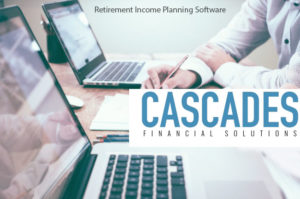Co-founder & President of Cascades
(Sponsor Content)
We normally think about it in the few years leading up to the “Retirement Date,” but should we be crunching the numbers at other times?
The short answer is yes and here is when: preceding a change in career or a shift to part time, following a large increase or decrease in annual income. You may also wish to take the measure of a move from salary to self-employment, or upon the death of a spouse or following a divorce.
It is important to keep in mind the difference between Retirement Planning — the amount of money you will have accumulated by a specific retirement date — and Retirement Income Planning, which is the income that you will derive from that accumulated cash. Those are the numbers that really matter and represent the income you will want to live on (and sustainably so) for the rest of your life.
The following commentary is from a user of Cascades software and highlights her specific number-crunching situation:
I am currently in my early fifties, but I had already been worrying for several years about how much I needed for my retirement and how best to plan for it. As academics, we often assume our pension is sufficient: if we are even tenured, as many of us are not; if we have been working at a decent salary for many years, as many of us have not; and if we have been taught to think about or plan for retirement, as most of us have not.
As I spoke to my colleagues, I began to realize that the problem of not planning was widespread. One colleague (and friend) told me she did not even know what an RRSP was. Another colleague and friend revealed she never considered saving money in a TFSA. Still another had no idea what her pension was because she had worked at four different Universities, and so her pensionable earnings were scattered across these institutions.
Going to the bank to gain some insight and assistance was not much better. The bank, one of the largest in Canada and the one with which I have dealt since I was eighteen years of age, could not have been more disappointing. Most institutions are comfortable taking your money to invest it, but they are considerably less interested in helping you plan what to do with it. It’s not just an egregious oversight, it’s bad customer service. So, the bank with which I work did some preliminary planning, but it was largely unsatisfactory. How would I know how much I would have upon retirement? What were the sources of income I could rely on? How long would the money I saved support me? I still had no idea.
Ian Moyer introduced me to the program called Cascades. At first, I confess I was sceptical. I had already run through the bank’s system. I came to realize, however, that the bank’s system was a little like wobbling down the street on a rickety tricycle, while Cascades was this very fine Ferrari in which I could take a spin around the city instead.
I’ll take the Ferrari, thank you very much!
Here’s what the program allowed me to understand: not only what precisely were the sources of retirement income upon which I could rely (not just my work’s pension plan, which is woefully inadequate); not only how much I would have upon retirement; and not only how much more I would need before I could either retire or semi-retire; but also — and this was key — what money and when I should withdraw it from each savings module.
I am deeply grateful for having been introduced to this program, which has allowed me to plan with greater precision how much more I need to save to retire, how to use the money once I do, and when I can retire—sooner, as it turns out, than I initially thought. — Linda Mancini, Quebec
 Ian Moyer is a 40 year veteran of the financial services industry. He is a long term member of the MDRT, as well as Court and Top of the Table. In 2013 he started developing Cascadesfs.com with his business partner Jonathan Kestle. Cascades’ focus is to illustrate the value of advice, by revealing the tax difference of comparing withdrawal strategies.
Ian Moyer is a 40 year veteran of the financial services industry. He is a long term member of the MDRT, as well as Court and Top of the Table. In 2013 he started developing Cascadesfs.com with his business partner Jonathan Kestle. Cascades’ focus is to illustrate the value of advice, by revealing the tax difference of comparing withdrawal strategies.



